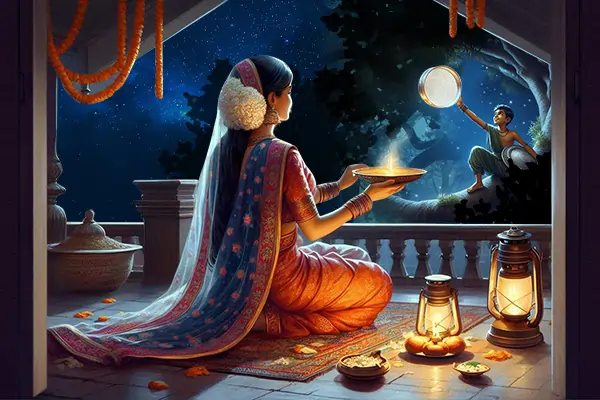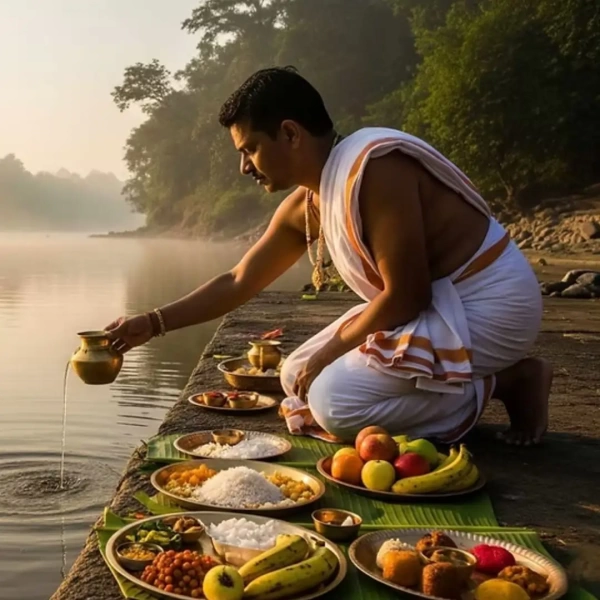
Karva Chauth is a revered Hindu festival celebrated by married women, primarily in Northern India, including Punjab, Haryana, Uttar Pradesh, Rajasthan, and Delhi. On this auspicious day, women observe a strict fast from sunrise to moonrise for the safety, longevity, and prosperity of their husbands. Traditionally, this festival strengthens the marital bond and signifies selfless love and devotion.
Karva Chauth Puja Benefits
Observing the Karva Chauth Puja is believed to bring spiritual and emotional rewards:
1. Longevity and Well-being of Husband
The primary benefit is the enhanced health and long life of the husband. Women pray for their partner’s protection from evil influences and premature death.
2. Strengthens Marital Bond
Karva Chauth deepens the emotional and spiritual connection between partners. The wife’s devotion and the husband’s appreciation reinforce the sacredness of marriage.
3. Spiritual Growth
Fasting and rituals cultivate patience, self-control, and mindfulness. It offers an opportunity for spiritual cleansing and introspection.
4. Cultural Preservation
Puja rituals keep ancient Vedic traditions alive. This festival educates younger generations about family values, traditions, and customs.
5. Community Bonding
Women gather for group pujas, creating a sense of solidarity and shared devotion within communities.
Want to know more about Festival & Vrata Guides
Karva Chauth Puja Procedure

The Karva Chauth Puja is a meticulously structured ceremony. Here’s a step-by-step guide:
1. Preparations Before the Fast
Sargi
- Given by the mother-in-law before dawn, it includes fruits, sweets, dry fruits, and water.
- Women consume this early morning to sustain themselves through the day.
Karva Chauth Puja Items
Prepare a thali with:
- Karva (earthen pot filled with water)
- Incense sticks, diya (lamp), sindoor, bangles, mehendi
- Fruits, sweets (especially mathri), and coins
- Image or idol of Goddess Parvati
- A sieve (chhalni)
- Decorative cloth for the puja area
2. Fasting Begins (Before Sunrise)
- After consuming the sargi, women begin the nirjala fast (no food or water) until the moon rises.
3. Afternoon Preparations
- Women dress in traditional attire, usually red or bright-colored sarees or suits.
- They apply mehendi on their hands and adorn themselves with jewelry.
- Karva pots are decorated and filled with water or gifts.
4. Evening Puja (Before Moonrise)
Women gather for a group or individual puja around a decorated space.
Rituals:
- Katha (Story) Reading: The legend of Queen Veeravati and Goddess Parvati is narrated.
- Rotating Thali: Women pass their thalis around in a circle while singing traditional songs.
- Offering to the Karva: Women offer sweets, coins, and water to the Karva and seek blessings.
5. Moonrise Ritual
Once the moon is sighted:
- The woman views the moon through a sieve, then looks at her husband’s face.
- She offers water to the moon and prays for blessings.
- The husband then helps his wife break the fast by offering her water and a sweet.
Dos and Don’ts in Karva Chauth Puja

Dos
- Start Early: Wake before sunrise to eat the sargi properly.
- Stay Hydrated (Before the Fast): Drink enough water during sargi to prevent dehydration.
- Respect Rituals: Follow puja steps as per tradition or family customs.
- Stay Positive: Focus on the spiritual and emotional aspects of the fast.
- Use Puja Time for Meditation: Reflect, pray, and stay calm.
- Dress Modestly and Traditionally: This shows respect for the occasion.
- Involve the Family: Let your spouse and family support and participate.
- Maintain Cleanliness: Ensure the puja area and yourself are clean and pure.
Don’ts
- Do Not Consume Food or Water: The fast is traditionally nirjala.
- Avoid Sleeping Excessively: Use time for chanting, prayer, or rest, not laziness.
- No Negative Emotions: Avoid anger, gossip, or harsh words.
- Avoid Cutting or Washing Hair: Traditionally considered inauspicious.
- Don’t Wear Black or White: Bright colors like red are considered auspicious.
- Avoid Non-Vegetarian Food (Before and After Fast): Stay sattvic for spiritual purity.
- Do Not Skip the Katha: Hearing the story is essential to complete the ritual.
- Avoid Physical Strain: Take rest and avoid exerting yourself.
Conclusion
Karva Chauth is more than just a day of fasting; it is a celebration of love, tradition, and commitment. The dedication women show during this festival is a testimony to the strength and purity of marital bonds. The rituals performed during Karva Chauth not only ensure the well-being of one’s partner but also connect individuals to their spiritual roots. As society evolves, so do practices—some couples now fast together, making it a mutual expression of love and respect.
While the ritualistic aspects are vital, the essence lies in the emotion, intention, and devotion behind it. Celebrating Karva Chauth mindfully enhances both the spiritual and emotional quotient of marriage.
Frequently Asked Questions (FAQs)
Q1. Can unmarried women observe Karva Chauth?
Yes, some unmarried women keep the fast to pray for a good future husband or the well-being of their fiancé. They can follow similar rituals but may modify the intention behind the puja.
Q2. What if a woman is pregnant or unwell—should she still fast?
Health comes first. If pregnant, diabetic, or ill, one can perform the puja without fasting or keep a partial fast. Many believe intention is more important than the act.
Q3. Is it mandatory to hear the Karva Chauth Katha?
Yes, listening to the story is an essential part of the ritual. It connects the observer with the historical and spiritual roots of the festival.
Q4. What is the best time for Karva Chauth puja?
The puja is typically done in the evening before moonrise, during the Sandhya time (twilight), usually between 4 PM to 6 PM.
Q5. What is the significance of the sieve (chhalni)?
The sieve symbolizes clarity and divine sight. Women view the moon through the sieve and then their husbands, symbolizing the filtering of negativity and focusing on divine blessings.
Q6. Can men fast on Karva Chauth?
Absolutely. In modern times, many husbands fast alongside their wives as a gesture of equality and mutual love.
Q7. What to do if the moon is not visible due to clouds?
If the moon is not visible, women may offer water in the direction of the moon based on the panchang or wait until it appears. Faith is more important than visibility.
